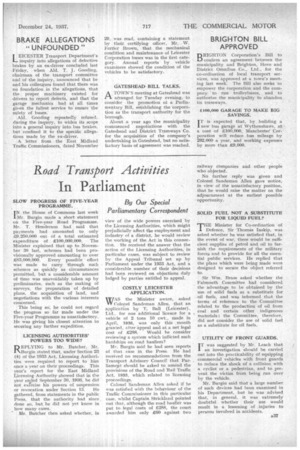Road Transport Activities
Page 25

If you've noticed an error in this article please click here to report it so we can fix it.
In Parliament
By Our Special Parliamentary Correspondent
SLOW PROGRESS OF FIVE-YEAR PROGRAMME.
I N the House of Commons last week Mr. Burgin made a short statement on the Five-year Road Programme. Mr. T. Henderson had said that payments had amounted to only £9,250,000 out Of a total estimated expenditure of £100,000,000. The Minister explained that up to November 30 last, schemes had been provisionally approved amounting to over • £83,000,000. Every possible effort was made to carry through such schemes as quickly as circumstances permitted, but a considerable amount of time was unavoidably taken up by preliminaries, such as the making of surveys, the preparation of detailed plans, the acquisition of land, and negotiations with the various interests concerned.
This being so, he could not regard the progress so far made under the Five-year Programme as unsatisfactory. He was giving his closest attention to securing any further expedition.
LICENSING AUTHORITIES' POWERS TOO WIDE?
REPLYING to Mr. Butcher, Mr. Burgin stated that, under Section 23 (4) of the 1933 Act, Licensing Authorities were required to report to him once a year on their proceedings. This year's report for the East Midland Licensing Authority showed that in the year ended September 30, 1936, he did not exercise his powers of suspension
or revocation under Section 13. He gathered, from statements in the public Press, that the authority had since done so, but he did not yet know in how many cases.
Mr. Butcher then asked whether, in view of the wide powers exercised by the Licensing Authorities, which might prejudicially affect the employment and industry of a district. he would review the working of the Act in this connection. He received the answer that the action of the Licensing Authorities, in particular cases, was subject to review by the Appeal Tribunal set up by Parliament under the 1933 Act, and a considerable, number of their decisions had he'en reviewed on objections duly lodged by parties entitled to appeal.
COSTLY LEICESTER APPLICATION.
WAS the Minister aware, asked YV Colonel Sandeman Allen, that an application by T. Ball (Leicester), Ltd., for one additional licence for a vehicle of 2 tons 10 cwt., made in April, 1936, was only this ,month granted, after appeal and at a net legal cost of £288. Would he consider reviewing a syslem which inflicted such hardships on road hauliers?
Mr. Burgin said he had seen reports of that case in the Press. He had received no recommendations from the Transport Advisory Council that Parliamept should be asked to amend the provisions of the Road and Rail Traffic Act, 1933, which related to licensing proceedings.
Colonel Sandeman Allen asked if he was satisfied with the behaviour of the Traffic Commissioner in this particular case, whilst Captain Strickland pointed out that, although the road haulier was put to legal costs of £288, the court awarded him only £60 against two
railway cbmpanies and other • people who objected.
No further reply was given and Colonel Sandeman Allen gave notice, in view of the unsatisfactory position, that he would raise the matter on the adjournment at the earliest possible opportunity.
SOLID FUEL NOT A SUBSTITUTE FOR LIQUID FUEL?
THE Minister for Co-ordination of
Defence, Sir Thomas Insldp, was asked whether he was satisfied that, in the event of war, there would be sufficient supplies of petrol and oil to furnish the requirements of the military forces and to provide for all the essential public services. He replied that the plans which were being made were designed to secure the object referred to.
Sir Wm. Brass asked whether the Falmouth Committee had considered the advantage to be obtained by the use of solid fuels as a substitute for oil fuels, and was informed that the terms of reference to the Committee related to the production of oil from coal and certain other indigenous materials the Committee, therefore, did not consider the use of solid fuel as a substitute for oil fuels.
UTILITY OF FRONT GUARDS.
I T was suggested by Mr. Leach that an investigation should be carried out into the practicability of equipping commercial vehicles with front guards to reduce the shock of a collision with a cyclist or a pedestrian, and to prevent the victim from being run over by the vehicle.
Mr. Burgin said that a large number of such devices had been examined in his Department, but he was advised that, in general. it was extremely doubtful whether their use would result in a lessening of injuries to persons involved in accidents.


























